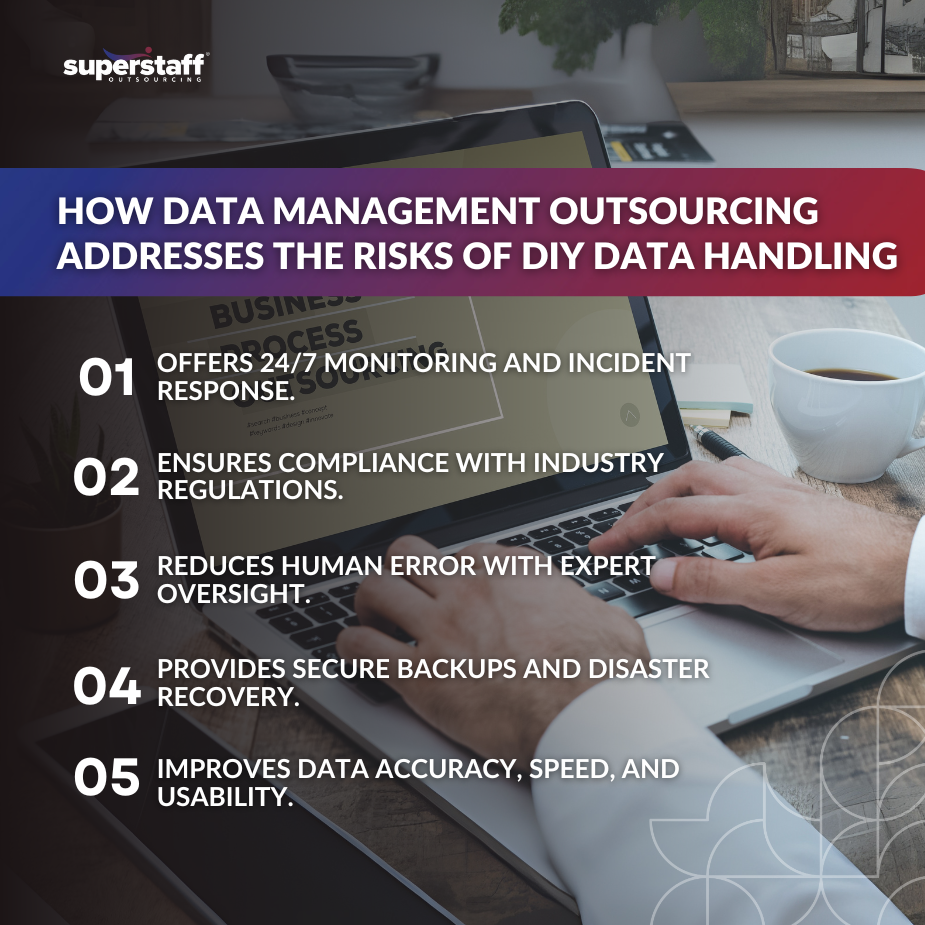
Many companies think managing data in-house is the more cost-effective option—but what they often overlook are the hidden risks lurking beneath the surface. From compliance concerns to data breaches, DIY data handling can expose businesses to significant operational and financial vulnerabilities.
In today’s digital-first economy, data is no longer just a byproduct of business activity—it’s a core asset. It informs decisions, drives automation, shapes customer experiences, and fuels innovation. But when companies attempt to manage sensitive information internally without the proper tools, talent, or governance frameworks, the results can be costly. Think lost files, unauthorized access, or even non-compliance with data privacy laws.
That’s where data management outsourcing comes in. By partnering with experienced service providers, businesses gain access to secure infrastructure, specialized expertise, and round-the-clock oversight that would be expensive and time-consuming to build in-house.
This blog unpacks the often-overlooked dangers of DIY data practices and explains how outsourcing data management isn’t just safer—it’s a strategic move that allows companies to operate more efficiently, stay compliant, and focus on what they do best. If you’re still relying on spreadsheets, manual processes, or overstretched internal teams to handle your business data, this is your sign to rethink your approach.
The Hidden Risks of DIY Data Management
DIY data management may feel like a safe, budget-friendly approach, but the hidden risks often outweigh any short-term savings. Mishandled data can have far-reaching consequences—from damaged reputations to financial penalties.
First, there’s the increased risk of data breaches. Most in-house systems lack advanced cybersecurity infrastructure, leaving them vulnerable to attacks. Even something as simple as using outdated software or unsecured Wi-Fi can open the door to cybercriminals.
Then there are regulatory compliance issues that impose strict requirements for how businesses collect, store, and manage data. Examples include the GDPR, CCPA, and HIPAA. Failing to comply with these regulations can lead to steep fines and legal consequences.
Human error is another major concern. Without formal training or strict protocols, employees can easily input the wrong data, delete critical files, or mismanage backups. This can lead to duplication, data loss, or decision-making based on inaccurate information.
And what happens when disaster strikes? Many DIY setups lack proper backup systems and disaster recovery plans. A power outage, ransomware attack, or hardware failure can wipe out valuable business data in seconds—with no way to recover it.
These risks aren’t always visible at first. But when they surface, the damage is often irreversible. That’s why data management outsourcing solutions for small and mid-sized business operations have become a strategic necessity—providing the expertise and safeguards many internal teams simply can’t match.
What’s at Stake: Examples of DIY Gone Wrong
Businesses across industries have experienced the pitfalls of poor data management firsthand. Here are just a few cautionary tales:
- A small e-commerce business was fined thousands of dollars after it failed to meet GDPR requirements. They had been storing customer data in unsecured spreadsheets without explicit consent.
- A fast-growing startup lost months of client work after a junior staffer accidentally wiped a shared drive. They had no automated backup system in place, and the files were unrecoverable.
- A mid-sized manufacturing company miscalculated inventory and production targets due to a spreadsheet error. The mistake cost them millions in excess production and lost contracts.
Each of these scenarios started with the best of intentions. But without the right tools and processes, even minor oversights can spiral into major crises. To avoid these pitfalls, more and more businesses are turning to scalable data processing outsourcing.

Why Outsourcing Data Management Is a Smart Business Move
Data management outsourcing enables businesses to access advanced infrastructure, round-the-clock monitoring, and expert-level support—without the overhead of building an internal team from scratch.
With 24/7 monitoring and incident response, outsourcing partners can detect issues in real time and prevent small glitches from becoming full-blown disasters. You also get access to data hygiene processes that ensure your databases are accurate, up to date, and free from redundancy or corruption.
Another major benefit is regulatory compliance. Outsourcing firms stay current on the latest changes in data protection laws and incorporate compliance protocols into their systems. This helps you avoid costly violations while giving your customers peace of mind.
Additionally, outsourced teams offer scalable storage and retrieval capabilities. Whether you’re handling gigabytes or terabytes of data, your partner can help you grow without missing a beat.
And it’s not just about safety—outsourcing also opens the door to optimization.
From Risk Mitigation to Data Optimization
When you outsource data entry and management, you don’t just reduce risk—you increase your organization’s capacity to leverage data strategically.
For example, professional data management outsourcing services improve the accuracy and reliability of your data. This means better forecasting, smarter budgeting, and more confident decision-making.
Outsourcing also enhances data analytics and reporting. Instead of wasting time cleaning and organizing raw data, your team can focus on interpreting insights and taking action.
Speed is another advantage. With experienced specialists and automation tools in place, outsourced teams can process and retrieve data faster than most internal teams, giving your business the agility it needs to stay competitive.
Understanding how to data management outsourcing securely is key to unlocking these benefits. With the right partner, you not only protect your information—you also turn it into a catalyst for smarter, faster, and more informed growth.
Data Management Outsourcing Best Practices: Choosing a Trusted BPO Partner
Not all outsourcing providers are created equal. When evaluating potential partners, it’s essential to look beyond pricing and dig into their security protocols, industry expertise, and support capabilities.
Start by vetting providers with a proven track record of protecting data. Ask about encryption standards, firewalls, access controls, and certifications like ISO 27001 or SOC 2.
Next, make sure they have experience with relevant regulations in your industry. Whether you operate in healthcare, finance, or e-commerce, your outsourcing partner should understand the specific compliance requirements that affect your business.
Also consider how they handle quality control, user access, and ongoing support. Do they offer regular audits? Is there a dedicated support team available for issue resolution? What happens if something goes wrong?
A good data management outsourcing partner doesn’t just manage your data—they help manage your peace of mind.
Secure, Scalable, Smart—Why Data Management Outsourcing Wins Every Time
DIY data handling may appear efficient, but the hidden risks can cost more than outsourcing ever will. From data breaches to compliance violations and lost business opportunities, internal mismanagement can quietly erode your operations from the inside out.
Data management outsourcing offers a safer, more scalable path forward. It reduces risk, ensures compliance, boosts productivity, and allows your team to focus on strategic priorities rather than spreadsheet firefighting.
Don’t wait for a data disaster to rethink your approach. Discover how SuperStaff can help you secure, manage, and maximize your data. Schedule a consultation today.






